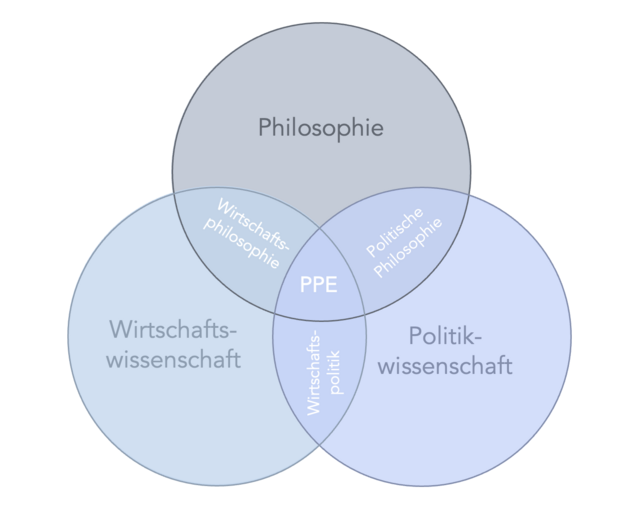The contents of study

The Heinrich Heine University of Düsseldorf offers an interdisciplinary curriculum with the program Philosophy, Politics and Economics (PPE). Students in the PPE program complement the knowledge acquired in the political science and economics portions of their studies with analytical and critical skills taught in philosophy. The study contents from the participating subjects do not simply stand individually but rather are integrated in modules with interrelated content. Students learn to recognize which subject areas economic theories provide information about and on which conceptual foundations they are based; they learn to identify which moral principles are guiding in political science studies. They learn to recognize premises, to defend their positions argumentatively and to consider ethical aspects appropriately in their decision-making. In addition to teaching methodological competencies from their respective academic practice, the students thus contribute to the interdisciplinary perspective of the program through selected subject content - aspects and discourses of political and economic philosophy, for example, connect to the knowledge imparted in political science and economics. The close integration of the study contents from philosophy, political science and economics enables graduates to deal rationally with the diversity of functional, ethical, cultural, and personal perspectives.
Main competences of the subjects
In the field of philosophy, the PPE program provides insights into the fields of theoretical and practical philosophy. Through this, logical and conceptual thinking and convincing argumentation are taught. Through specialized introductions to ethics, political philosophy, and economic philosophy, foundations on which both political science and economics build are laid, enabling students to critically reflect on economic and political issues and find innovative solutions.
- Ethics/ Moral Philosophy
- Epistemology and Philosophy of Science
- Political philosophy
- Logic & Argumentation
- Metaphysics/ Philosophy of the Mind
- Philosophy of Economics
The political science modules provide knowledge about political processes, structures, contents, and especially collective actions. Through knowledge of those institutions that shape society and determine social coexistence, it is possible to analyze current events and challenges with broad basic knowledge.
- Introduction to Political Science
- Democracy´s aspiration and reality
- Analysis of political decision-making and communication
- Comparison of political systems
- European Integration
- Methods of Political Science
Economics examines the rational use of scarce goods and provides knowledge about economic relationships. Due to the strong link of politics and economics, social challenges always have an economic dimension, which makes economics indispensable as the third subject of the PPE program to successfully deal with current issues. During the program, students take modules in economics, which provide fundamental insights into market behavior, economic growth and, at the same time, coordination structures.
- Microeconomics
- Economic Policy
- Macroeconomics
- Methods of Economical Science
Students must complete method modules during the course of study. While the philosophical methods are compulsory, students can choose between methods of the two other departments. Therefore, it is possible to either specialize on Political Science or Economics. With a focus on Political Science, you take Survey- and Analysis methods, while students with an economical focus enroll in Statistics I and II and Econometrics modules.
Interdiciplinarity
The interdisciplinarity of the study program manifests itself in various places: On the one hand, interfaces of the departments are taught as part of the basic education. In some cases, these already are implemented in the course of the respective departments (e.g. "Economic Policy" or "Political Philosophy"), other modules (e.g. "Philosophy of Economics") were set up specifically for PPE.
The third year on the other hand consists only of interdisciplinary modules. Four PPE modules address interdisciplinary topics. To this end, areas such as "Individual and Collective Decisions" or "Leadership and Processes" will be considered from the perspectives of all three departments. However, cooperations between the departments and institutes also create new events in which students work in an interdisciplinary manner under guidance. In the process, the range of events changes with each semester, which means that new collaborations are always being created and there is room for current and relevant topics.
Düsseldorf as an academic location
As the capital of the state of North Rhine-Westphalia and a prominent business location, Düsseldorf offers an ideal environment for gaining initial experience and applying knowledge in internships, either within the university or on a voluntary basis. In close cooperation with companies from the Düsseldorf area as well as the state parliament of North Rhine-Westphalia, internships are provided and events are organized that link university education, academic research as well as entrepreneurship and politics. Students in the PPE program are invited at an early stage to participate in events that transcend the university context. Regular teaching and research projects, most recently a lecture series about populism, provide an impression of this. In a final round of lectures with a panel discussion, PPE students were able to present the results of their work in lectures and a poster show in the NRW state parliament. More information can be found on the page of the Landtag NRW.

